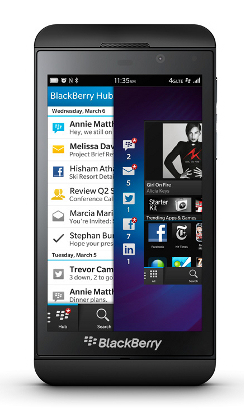 Yesterday RIM, now renamed Blackberry, introduced the Blackberry 10. Tech.Pinions columnist, Steve Wildstrom, is cheering for Blackberry as are many Tech.Pinion regular readers and millions upon millions of others. Does the new, re-invented, Blackberry stand a chance? Or is Blackberry merely metaphorically repeating the infamous charge of the Light Brigade? In order to answer that question, let’s look at some computing history.
Yesterday RIM, now renamed Blackberry, introduced the Blackberry 10. Tech.Pinions columnist, Steve Wildstrom, is cheering for Blackberry as are many Tech.Pinion regular readers and millions upon millions of others. Does the new, re-invented, Blackberry stand a chance? Or is Blackberry merely metaphorically repeating the infamous charge of the Light Brigade? In order to answer that question, let’s look at some computing history.
The Personal Computer
In the late seventies and eighties, at the dawn of the age of personal computing, there were scores of different competing computers and computing operating systems. By the eighties, things had begun to shake out. One by one, computers like the TRS-80, Commodore 64, Apple II, Atari ST, Amiga and others took their final bows and left the stage forever. By 1995 the only two players left standing were computers powered by Windows and the Mac. And as many of you know, the Mac was barely standing.
From that day until this, no one has seriously challenged Windows’ leadership in personal computing. For almost three decades, Mac aficionados have insisted that theirs is the superior operating system. Did that help the Mac overcome Window’s dominance and secure the personal computing crown for itself? No it did not.
On February 19, 1996, in an interview with Fortune, Steve Jobs said:
“The PC wars are over. Done. Microsoft won a long time ago.”
He was right.
LESSON #1: HAVING THE BEST HARDWARE AND/OR OPERATING SYSTEM IS NO GUARANTEE OF VICTORY.
LESSON #2: ONCE A PLATFORM IS ENTRENCHED, IT IS ALMOST IMPOSSIBLE TO DISLODGE.
The MP3
In the self-same Fortune interview referred to above, Steve Jobs also said:
“If I were running Apple, I would milk the Macintosh for all it’s worth — and get busy on the next great thing.”
And that’s exactly what Steve Jobs did when he returned to Apple. Apple continues to milk the Mac to this day. And their next great thing was – the iPod.
In the late nineties, there were several companies competing to win the nascent MP3 wars. In 2001, Apple introduced the iPod, but it was really the one-two combination of the iPod and iTunes that eventually won the day. iTunes helped store, organize and deliver your music to your iPod and the it was the iPod – with its clean hardware, its easy to understand user interface and its easy to use click wheel – that helped you to easily find your music and play it.
“Do not renew an attack along the same line (or in the same form) after it has once failed.” ~ B.H. Liddel. Hart, Strategy
It’s important to understand two things here. First, the iPod was not a direct attack on Microsoft Windows. Far from it. In military terms, you don’t conduct a frontal assault against a well-entrenched enemy. In business terms, you don’t defeat the industry standard bearer just by being a little better — or even a lot better — at what you do. The Mac has been attacking Windows since 1984 and it still has only 5% to 10% market share to show for its efforts. (True, the Mac’s consolation prize is that it may garner as much as 35% of the sector’s profits, but that still does not make the Mac anywhere near the industry standard.)
Second, Apple did not win the MP3 wars simply by being better than the existing players from Sony, Archos and others. With the iPod/iTunes combo, Apple leap-frogged the existing market and created a whole new category of device. It was the synchronization of iTunes with the iPod that was its killer feature. And despite all the criticism that iTunes deservedly receives, no other competitor has come close to duplicating its functionality. In military terms, Apple created a whole new front. In business terms, Apple created a whole new category. And once Apple established itself as the standard for the new MP3 category, they never let go their grip. To this day, Apple dominates the MP3 market with over 70% market share and gawd-knows-how-much profit share.
Sony, Archos and others tried to unseat the iPod by providing cheaper devices with more features. Didn’t happen.
Microsoft came late to the MP3 game but they came with what they, and most industry observers, thought was the winning strategy. With PlaysForSure, Microsoft intended to duplicate, in MP3’s, the same success that they were enjoying in personal computing. Microsoft would create the operating system, license it to manufacturers and then watch as their open licensing system inevitably overwhelmed Apple’s closed operating system. Didn’t happen.
After a while, Microsoft tired of not gaining any market share (or any profits), threw their PlaysForSure partners under the bus, and created the Zune. (Kind of reminds me of how Microsoft is handling the Surface. But I digress.) It’s hard to remember now, but most industry observers predicted that the Zune was the beginning of the end for Apple and the iPod. At that time, Apple was a mere upstart and Microsoft was the 900 pound gorilla that everyone feared. What Microsoft wanted, Microsoft took. With the weight of Microsoft behind the Zune, how could it fail to become the industry standard? Didn’t happen.
LESSON #3: WHEN IT COMES TO PLATFORMS AND STANDARDS, TIMING MATTERS. THE FIRST MOVER AND THE FAST FOLLOWER HAVE THE INSIDE TRACK. THE REST JUST REMAIN AT THE BACK OF THE PACK.
The Smartphone
“Do not throw your weight into a stroke whilst your opponent is on guard.” ~ B.H. Liddel. Hart, Strategy
In 2006, Smartphones were ruled by the Palm, Windows, RIM and Nokia. In 2007, Apple introduced the iPhone. By 2013, Palm was gone, Windows Mobile was gone, Nokia was a niche player, dependent upon Microsoft’s new mobile operating system, and RIM was making a bold gamble to regain relevance. What’s important to understand is that Apple’s iPhone was not, as many thought, a more expensive smartphone. Rather, it was an inexpensive pocket computer. Apple did not really make a better smartphone. Instead, they opened a new front, created a whole new category of device, and then dominated that category. Google did an excellent job of fast following with Android and now, between them, Apple’s iOS and Google’s Android sell more than 90% of all smartphones.
Within a year after the introduction of the iPhone, Palm tried to reinvent themselves, but they lacked the resources to make it happen. Windows Mobile re-invented itself into Windows Phone 7, and again into Windows phone 8, and what has that gotten Microsoft? Perhaps 3% market share? Microsoft has all the resources in the world. They have tremendous business connections. They’re patient and persistent. And their Windows Phone operating system is well-respected. Yet they can’t seem to gain any traction in the phone market. If Microsoft, with all its advantages and with a four year head start, can’t gain any traction in the smartphone markets, then what realistic chance does Blackberry have?
LESSON #4: YOU DON’T OVERCOME A MARKET LEADER THROUGH A DIRECT ASSAULT. YOU FLANK THEM.
The Tablet
“Exploit the line of least resistance – so long as it can lead you to any objective which old contribute to your underlying object.” ~ B.H. Liddell Hart, Strategy
In 2001, Bill Gates was touting the advantages of the tablet. Yet in 2010, it took Apple only 7 months to sell more tablets than Microsoft had been able to sell in the previous 10 years. Did Apple do this by simply making a better tablet? No. Apple re-invented the tablet market by adding instant-on, longer battery life and a capacitive touch screen. But most of all, Apple re-invented the tablet by creating a wholly new touch user interface. Apple didn’t improve on the existing Microsoft tablets. They created a new category of device with a wholly new operating system.
By 1995, Microsoft’s Windows dominated personal computing, never to be challenged again. Neither Apple nor any other contender ever did or ever will unseat Windows from its dominant position. Instead, Apple created a new market and dominated it. By attacking Microsoft where it was weakest, Apple did in 7 months in tablets what it could not do in 20 years in personal computers.
LESSON #5: THE ART OF WAR IS THE ART OF AVOIDING A DIRECT ASSAULT AND IMPLEMENTING AN INDIRECT APPROACH TO ONE’S ENEMY. THE ART OF BUSINESS IS THE ART OF AVOIDING THE DIRECT ASSAULT AGAINST A COMPETITOR’S STRENGTHS AND LEVERAGING ONE’S STRENGTHS AGAINST A COMPETITOR’S WEAKNESSES.
Conclusion
Theirs not to make reply,
Theirs not to reason why,
Theirs but to do and die:
Into the valley of Death
~ Alfred, Lord Tennyson, The Charge of the Light Brigade

Do I hate Blackberry or wish them ill? Absolutely not. I have tremendous respect for what they’ve done. The original Blackberry phones were category busters and a wonder to behold. But the truth is, it does not matter if the Blackberry 10 hardware and software are narrowly better than the iPhone or Android phones. They have to be so superior that customers will be willing to switch. Because remaining the number four, or even the number three, smartphone OS is not going to cut it with developers. And people don’t switch platforms unless the alternative is not just superior but FAR superior to their current platform. Just ask the Mac, the Zune, and Windows Phone 7.
If you want to argue that a fast follower can overtake a first mover, I will agree. If you want to argue that the Blackberry 10 – introduced over 6 years after the iPhone was introduced – is a fast follower, I will respectfully disagree.
In war, you don’t win a frontal assault unless you have overwhelming military superiority. The art of war is, in part, about how to avoid making frontal assaults. In business, you don’t win a war against an establised standard unless you have overwhelming product superiority. The art of business is, in part, about differentiating your product and advancing your strengths against your competitor’s weaknesses.
Blackberry is not creating a new front or a new category. They’re attacking the existing leaders where they are entrenched and strongest. Does anyone honestly think that the Blackberry 10 is so superior to the iPhone, Android phones and Windows Phone 8 that it will overwhelm any of them? If not, the Blackberry 10 is the charge of the Light Brigade all over again…with similar results, but lacking the poetry.







